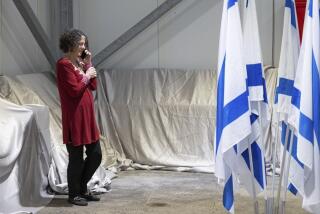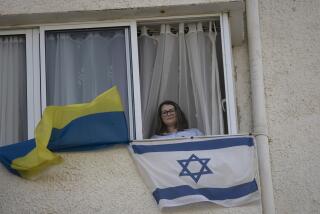Children Who Fled Bosnia War Return
- Share via
SARAJEVO, Bosnia-Herzegovina — Sprawled on the floor of the Bjelave Home for Children, the boys and girls watch Donald Duck cartoons in German. Their coloring books tell them that Der Hund hat Hunger--the dog is hungry.
But in an instant the children switch to the local language--or try to, at least--answering questions of visiting Bosnian television crews and responding to orphanage officials.
At the start of a long and brutal war, more than 30 Bosnian children were evacuated to Germany from Sarajevo, the capital. Earlier this month, they were sent home amid much of the same controversy that accompanied their removal nearly five years ago.
Are the best interests of the children being considered, or are the political and public relations interests of governments and Western do-gooders taking precedence?
Once the war ended about a year ago, Bosnian officials insisted on bringing the children back to their native country because as Bosnians, they belonged in Bosnia-Herzegovina. Some of the Germans involved in the original evacuation objected and asserted that the children were being used as a gimmick to encourage the repatriation of other Bosnian refugees in Germany.
German officials have announced their intention to send most of Germany’s estimated 300,000 Bosnian refugees back to their home country, even though many are Muslims whose homes now lie in Serb-controlled territory. About 100 people have been deported thus far, and Germany has been criticized for sometimes heavy-handed tactics in rounding up the deportees. Panic has set in among many of the Bosnians.
*
The children were a special case. Although labeled as orphans, some of the children have a living parent or other relative in Bosnia, Bosnian officials say. They came from dysfunctional families or were placed in Bosnian state orphanages for safety when the war broke out.
“We had a dilemma about whether to bring them back,” conceded Amir Zelic, director of the Bjelave home. “The standard of living is much higher in Germany--every fool knows that. But it has nothing to do with standards of living. In Germany, these kids would always be Auslaender [foreigners]. This is their homeland. Every country bases its future on its children. I can’t see why we should be any different.”
Bosnia is also trying to regain custody of 46 orphans in Italy, Zelic said. There, however, many of the children are in foster homes, and the Italians are fighting to keep them. Bosnian law does not permit foreign adoptions.
The evacuation to Germany in 1992 was both dramatic and perilous. It was arranged by two legislators from the German state of Saxony-Anhalt and was criticized as reckless at the time by U.N. refugee officials but praised by supporters as a courageous humanitarian gesture.
When the bus carrying 42 children made its way through the besieged capital, it came under sniper fire. A little girl and boy were killed. Photographs of the surviving children crying behind bullet-shattered bus windows took their place among the many haunting images of the war. Bosnian Serb militia also stopped the bus, and several children were removed.
Eventually, however, most of the group made it to safety in Germany. The children were raised in three orphanages and given bilingual education. From the beginning, according to Gerlinde Kuppe, social minister of Saxony-Anhalt, the German and Bosnian authorities had agreed that the children would be returned to their homeland after the war.
Others, however, question whether the conditions in Bosnia are stable enough for the children to live safely and comfortably. Although fighting has stopped, only minimal housing has been reconstructed, unemployment is high, and many people are psychologically traumatized.
Karsten Knolle, one of the original saviors of the children, fought the return up to the last moment. She charged that the children were being used as a “vanguard” of returning war refugees from Saxony-Anhalt.
“This early return of the children is to serve as a symbol of the normalization of living conditions in Bosnia and to promote the readiness of the other refugees in Germany to return,” editorialized the daily newspaper Frankfurter Rundschau. “Adult refugees have legal means and ways to fight a forced return to their homeland” while children do not, the paper noted.
While it is too early to know how the children will adjust, they seemed content and active during a recent visit to the Bjelave home.
The initial flood of journalists had subsided. The boys and girls colored drawings and tried to write their names. Some ran about chattering excitedly, and the older ones read aloud from books. The bright rooms were clean; the home, located on a hill on the edge of downtown Sarajevo, had electricity; the war damage had been repaired with international donations.
Dressed in a red jersey with a picture of a sailing bear, little Rina peered from behind thick eyeglasses and eagerly showed a visitor her bedroom. This is where her friend Dragana sleeps, she said, pointing to the bunk bed covered in Lion King quilts, and here is Emila. Rina’s well-worn Cabbage Patch doll kept watch.
Rina, who is 7, spoke in the Serbo-Croatian of Bosnia with a German accent. She, like the others, does not remember anything about prewar Sarajevo but thinks her new home is “pretty.”
Zelic said those children who have parents will eventually be reunited with them, but only gradually, to ease the readjustment.
“An uncle, a grandmother--any family is better than an institution,” said Samka Fejzic, a Bosnian teacher who accompanied the children in Germany and then returned to Sarajevo last year to prepare for their arrival. “The conditions here are really good, but they should be in a family.”
A few relatives have visited, Zelic said, but generally the mothers of the children have not shown much interest. The women lead precarious lifestyles, without work or with abusive partners, he said.
Several of the children suffer at least mild forms of mental retardation. Two Gypsy girls were at the home because their parents had abandoned them in hospitals when they were sick. One, Beta, remembered how her birth mother sat her on a stove and burned her buttocks.
Heda Prolaz, a matronly woman who has worked as a receptionist at the home for 20 years, said she cried when she finally saw the children returning. But even her favorite little boy, who was 2 when he left, doesn’t remember her.
“He was looking at me, but he didn’t recognize me,” she said, sighing. “He speaks more German than Bosnian now. I kiss him every day, but he doesn’t know me.”
Still, Prolaz said, considering the alternative of life in a besieged city where thousands were killed and food depended on humanitarian relief, it was better for the children to have escaped for the time they did.
“It was good for these kids,” she said. “So many other kids had to stay here during the war.”
Petra Falkenberg of The Times’ Berlin Bureau contributed to this report.
More to Read
Sign up for Essential California
The most important California stories and recommendations in your inbox every morning.
You may occasionally receive promotional content from the Los Angeles Times.













